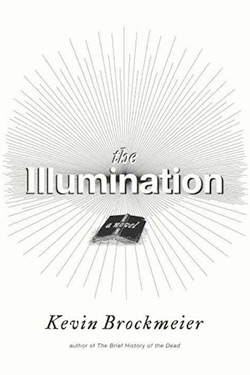The Illumination
by Kevin Brockmeier
reviewed by Adam Eaglin
The Illumination, Kevin Brockmeier’s third novel, rests on an eyebrow-raising premise: one day, without warning or explanation, all pain becomes visible as a glowing blue light. People’s cavities smolder in their mouths, arthritic joints beam gently, open wounds spill with brightness, headaches and cancer are visible, even emotional anguish appears like a faint cloud.
Throughout the novel, Brockmeier briefly allows his characters to explore the ways in which the phenomenon plays out politically and culturally—how it alters (or doesn’t) social interactions and society’s views of illness and humanity. But this is, thankfully, not the book’s focus. The Illumination, as the miracle is soon known, is the backdrop, an entry point through which to follow the novel’s beleaguered, beguiling cast of characters.
The Illumination tells the stories of six strangers, most of whom will never meet but who find themselves defined by their suffering: a woman who severs her finger while opening a package from her ex-husband, a mute schoolboy abused by his classmates and father, a photojournalist who survives a car accident while his wife does not, a homeless street vendor who is attacked by gangsters, a lonely writer with an incurable mouth condition, and a missionary with a terminally ill sister. They are all bound together, we learn, by their various encounters with a leather-bound journal filled with handwritten, sentence-long declarations of love from a husband to his wife. The book appears and disappears in each of their lives but leaves an indelible mark wherever it goes.
Brockmeier’s book could very easily have been cheesy or quaint, but it’s quite the opposite. The author manages to avoid melodrama, in part by focusing his narrative lens tightly on each character in turn. The result can be startling: six stories of suffering that feel authentic, heartrending, and raw. By dividing the book into six equal parts—one for each of the characters—the author does, however, risk writing an uneven book, and The Illumination is not perfect. Some chapters, and some characters, are more compelling than others. The opening pages, for instance, are thrilling and strange. Carol Ann Page cuts her finger while struggling to open a package from her husband. She later discovers that it’s an alimony check that her ex-husband mischievously wrapped in impenetrable packaging. The wound seems relatively minor at first, but as we follow Carol Ann, we see, eerily, how the infection grows. Brockmeier is unflinching in his descriptions of injury and he never resorts to dramatic irony. We’re shown, in the most minute, surprising details, how Carol Ann’s wound changes and affects her.
With last year’s Pulitzer Prize for Jennifer Egan’s A Visit from the Goon Squad, the concept of a novel in linked short stories is perhaps more popular than ever. The Illumination never bills itself as a collection of short stories, but in truth, that’s what it is. When a chapter ends, so does, effectively, that character’s story; the arc of the book is more emotional or associative than strictly narrative. In the chapter for Nina Poggione, the writer, Brockmeier seems to explain this impulse:
With her first book she had seen the world as a narrative, seen human lives as narratives. Now, instead, she saw them as stories. She wasn’t sure what had happened. Maybe she had experienced too much sickness. Maybe her sickness had made her less intelligent. Maybe her sickness had made her more sentimental. Maybe her sickness had returned her to the simple receptiveness of her childhood, when fitting people together seemed more important than taking them apart.
In defying and avoiding linear narrative, The Illumination keeps us deeply in the moment of each character, and forces us to compare each of their circumstances. The result is a book that at its best provides a patchwork view not just of human suffering but of how different people respond to suffering. It would be easy to fetishize the characters’ pain and say that the book finds beauty in pain. But Brockmeier actually seems ambivalent about this idea. Ryan, a missionary who has no interest in proselytizing but does so for his devout dying sister, is disturbed at the idea that God might actually find human suffering attractive: “What frightened Ryan—horrified him—was not the possibility that God did not love us but that He did love us and His love was merely decorative. Aesthetic rather than unconditional. That He loved us because we suffered, and our suffering was pleasing to His eyes.”
Brockmeier has a tendency, at moments of highest narrative tension, to end his chapters and thus his character’s story. And so perhaps my biggest complaint is that we don’t get to follow the characters longer. But it is also, of course, a compliment and testament to Brockmeier’s skill that he has created such enthralling characters, and that, in eschewing easy or happy resolutions, he has made The Illumination that much more authentic and memorable.
Published on March 18, 2013

